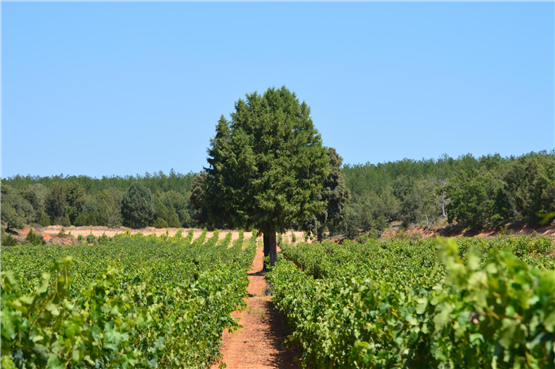

The Clunia vineyards are situated in the province of Burgos, Castilla y León. The vineyards of Clunia were established in the 1990s, during a time when few believed in the potential of this unique terroir, with an altitude of approximately 1,000 metres above sea level. The planes of Clunia reveal its historical past with coins and other remnants of the once-thriving Roman city havi been discovered here. Over two millennia ago Clunia’s Romans would have collected their harvest in little baskets and Bodegas Clunia is reminiscent of this, carrying on the traditions with hand harvested grapes.
The town of Coruña del Conde, where the vineyards and cellar of Clunia are situated, is inextricably linked to the history of the Roman colony of Clunia Sulpicia. Both locations were established on pre-existing Celtiberian settlements, with the larger of the two being the city-state of Clunia on the Alto de Castro hill. The capital of the Roman Tarraco province Colonia Clunia Sulpicia, named by Emperor Galba, played a pivotal role in the Romanization of Northern Spain. The magnificence of the Roman colony can still be observed today in the mosaics and ruins of the forum, shops, houses, and amphitheatre, which can be visited and viewed from some of their vineyards and cellars. Coruña del Conde boats a castle, Roman bridge, and a few small churches and Peñaranda de Duero, has 16th Century palaces and a 15th Century Watchtower. You can really immerse yourself in centuries of history and savour the typical Castilian culture at Bodega Clunia.
Historically they cultivated two grape varieties: three hectares of Syrah and 10 hectares of Tempranillo. However, they have recently introduced Malbec to their collection. Clunia was founded with the aspiration of producing wines of exceptional quality within a difficult climate. Despite the property spanning 70 hectares, not all of the land has been utilized for planting. They believe the most effective technique in managing the terrain is to exercise patience, allowing it to reveal its unique qualities. The soil composition is notably deficient, consisting of limestone, clay, and sand with pebbles and limestone loams. These characteristics allow optimal drainage, resulting in significantly limited yield, typically ranging from 3,000 to 4,000 kilograms per hectare. The distinctive nature of this terroir imparts a unique and unparalleled character to the wines, with subtle variations determined by the soil of each vineyard.
At such a high altitude and encompassed by towering mountains which channel wind across the plateau, the vines at Clunia persevere against the relentless climate, enduring the harsh summers and unforgiving winters. Warmer daytime temperatures assist in sugar development, whereas cool nights can help to preserve aromas, freshness and acidity. Bodegas Clunia produces powerful wine that is still fresh, elegant and aromatic with ripe tannins.
Today they cultivate 20 hectares of Tempranillo, Syrah, Albillo, and Malbec. Although they have plans to expand, they prefer quality parcels. Bodegas Clunia work with diligence and have a profound commitment to harnessing the difficult climate in which they’re based to make exceptional wine.


Our suppliers come from all around the world, but they share one common goal – quality.